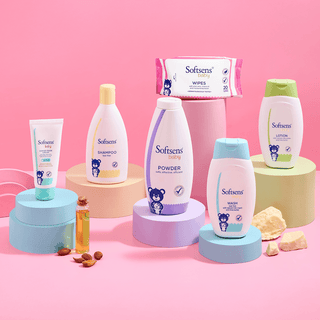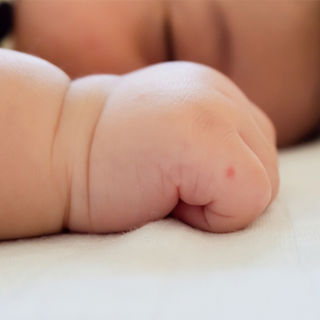
Moms & Dads, we know that watching your baby go through the teething stage can be pretty distressing. Your little one might suddenly become more irritable and their sleep schedule might also be turned upside down. To help you get through this phase. we’ve put together some helpful teething tips and information. Read on to find out when your baby will typically begin to teethe, what are some common teething signs, and how to help soothe your teething baby.
To begin with, your baby has 20 teeth under the gum line, waiting to erupt. So, when do babies start teething? Most babies begin teething anytime between 4-7 months and teething can continue anytime up to 2 years of age. The first to erupt are usually the two bottom front teeth, often followed by the two top front teeth. Some babies tend to teethe slower than others, and some even experience fewer symptoms than others.
So, what are some signs that your baby is teething? Here are some common baby teething symptoms:
1. Fussiness/Irritability: You’ll notice if your baby suddenly seems crankier than usual. This is due to the discomfort they’re experiencing and is a common sign of teething.
2. Red and swollen gums: Check your baby’s gums to see if they are red and swollen, instead of their usual pink.
3. Excessive drooling: If you notice that your baby is drooling far more than usual, this might be a sign of teething.
4. Restlessness at night and difficulty sleeping: The discomfort can keep your baby awake at night and disrupt your little one’s sleep schedule.
5. Poor appetite: Your little one might not be interested in eating at this time as sucking on the bottle or breast may hurt their swollen gums. If you’ve already introduced solids, they might reject those too during this time. Read on to find out what kind of foods you should offer your child when they’re teething.
6. Need to chew on everything: Biting on things can actually help reduce some of the pressure on baby’s gums, so you might notice that they will tend to chew on or bite things during this phase.
7. Low grade fever: Is fever a symptom of teething in babies? Yes, some babies can develop a low-grade fever. Keep an eye on their temperature and consult your pediatrician if the fever goes above 100-101 degrees.
8. Rubbing ears and cheeks: When your baby’s teeth are erupting, they may experience pain in their ears and around their cheeks, leading them to constantly rub these areas.
Now that you know how to spot the signs of teething in babies, let’s look at some ways in which you can comfort your teething baby and help them feel better,
HOW TO SOOTHE YOUR TEETHING BABY?
1. Put a little pressure on your baby’s gums
A little bit of pressure on your baby’s gums can actually relieve their pain and soothe their sore gums. One of the best ways to do this is my giving them a gum massage using your finger. Make sure you wash your hands thoroughly before doing this. Try this especially at night when your baby is having a hard time falling asleep. Letting your little one chew on your fingers can also be comforting to them.
2. Give them a cool washcloth to chew on
Here’s another parent-approved method to help soothe teething pain. Dip a clean wash cloth in water and wring it out. Then place the wash cloth in the fridge or freezer for a while before folding it giving it to your baby to chew on. Make sure the washcloth is clean, and doesn’t have any strings or anything that baby can choke on or swallow. Most importantly, always supervise baby when you give them something to chew on.
3. Offer cool/frozen treats
Anything that provides a cooling sensation can help reduce baby’s discomfort to a certain extent. If your baby has started solids, you can chill some of their favourite foods and offer it to them in a mesh feeder to chew on. Try mashed fruits – apples, pears, bananas are all great options. You can also freeze your breastmilk or formula in baby-safe popsicle molds and offer it to your little one to suck on. Since your baby’s appetite might have reduced during this phase, these are all great ways to get them to eat well too. Always supervise baby whenever offering any foods.
4. Refrigerate teething toys, a metal spoon or pacifiers
Once again, the coolness can help with pain. Clean any teething toy or pacifier well before putting it in the fridge and then offer it to your little one. Stay away from gel-filled baby teething toys. A lot of parents even use cold metal spoons for this purpose.
5. Wipe away drool constantly to prevent any rashes
Your baby will drool a LOT during this time, and if drool isn’t wiped away often, it can irritate your baby’s skin and cause rashes around their mouth. The best solution is to make baby wear a soft & comfortable bib that you can use to wipe away drool and to help soak it up, thus leaving baby’s skin clean and dry. Our range of soft muslin bibs are designed to be super gentle on your baby’s skin and are extra absorbent to soak up all kinds of messes and drool. Check out our range of baby bibs & burp cloths here.
6. Try using a white noise machine
Using a white noise machine might help them sleep better at night. If you don’t have one, you can also simply play white noise sounds using your phone
7. Lots of cuddle time
Doctor’s orders! Cuddling your little one and keeping them close during the teething phase can be extremely comforting to them, and can help calm them. Because a mother’s hug truly makes everything better!
8. Speak to your doctor to discuss other baby teething remedies or medication, if necessary
Consult your pediatrician and check if they can recommend any medication, if baby requires it.
This too is a phase, Mummas, and it WILL get better! We hope these tips help you comfort and soothe your teething babies. Good luck!



















